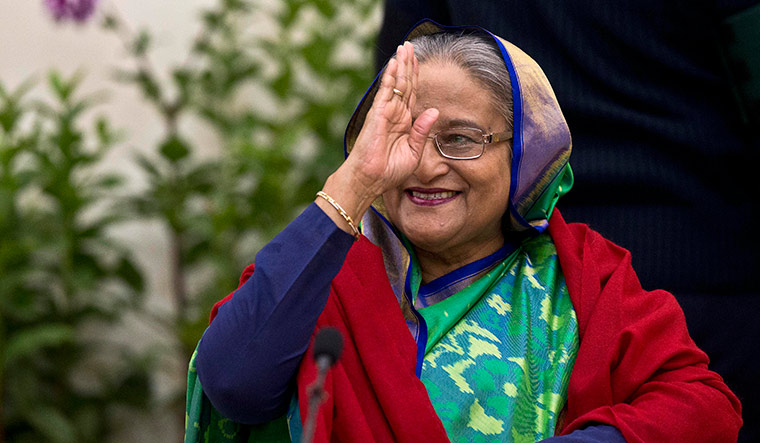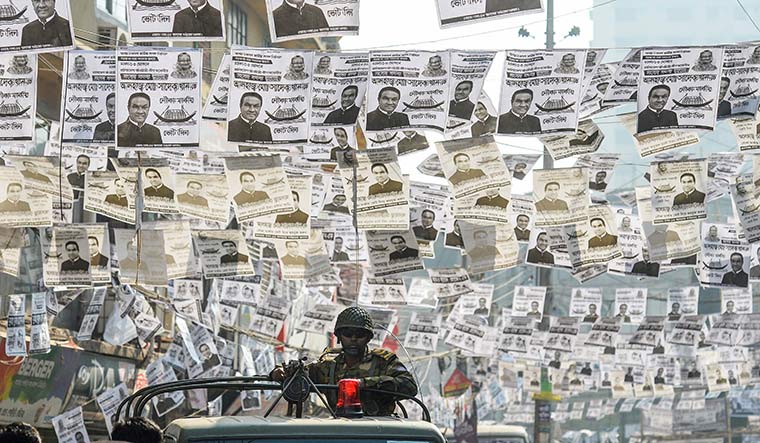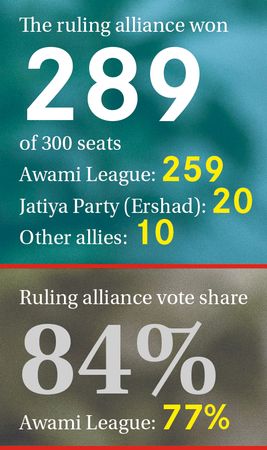SHEIKH HASINA HAD spent 15 years of her life in exile. But, she is now all set to complete 15 years as prime minister of Bangladesh. And, with her comprehensive victory in the parliament elections held on December 30, her reign could continue for many more years. She is one of the longest serving woman heads of state in the world. Indian Prime Minister Narendra Modi was the first to congratulate Hasina after the results were announced on the morning of December 31. The next to call were Chinese President Xi Jinping and Bhutanese King Jigme Wangchuck.
Hasina, 71, retained power, by winning 289 of 300 seats. (Election to one seat was deferred. The parliament has 50 more seats reserved for women, which are allocated on the basis of the overall vote.) In the 2014 elections, Hasina's coalition had won all the seats after the opposition Bangladesh Nationalist Party boycotted the polls. This time, the BNP took part in the elections, but won just 12 seats. The opposition alliance alleged irregularities, calling it the most rigged elections since independence.
“I have seen many elections in my life, before and after independence. But I have never seen such a rigged election,” said Kamal Hossain, leader of the opposition alliance. “Democracy in Bangladesh is at risk today. The 2018 elections were a farce,” he said.
Hossain, a legal scholar who headed the constitution-drafting committee of Bangladesh, said an election commissioner had acknowledged that the opposition did not have a level-playing field. The US embassy and many other foreign missions in Dhaka, too, have reportedly raised concerns about the impartiality of the election commission.
The results surpassed the expectations of even the ruling Awami League. Before the elections, senior leader A.K.M. Rahmatullah had told THE WEEK that his party would get 180 to 200 seats. But after the results were announced, he said the “unholy association” between the BNP and the Bangladesh Jamaat-e-Islami helped his party perform even better. “The BNP and the Jamaat wanted to sabotage the elections. They wanted to show the world that there was no democracy in Bangladesh. The people of Bangladesh gave them a fitting reply. They did not want to oust the party that brought independence to Bangladesh,” said Rahmatullah.
The opposition alliance plans to challenge the results. Hossain said he would approach the election commission to declare the election null and void. “If the commission refuses to do so, we have the right to go to court,” he said. Asked about the ruling front's allegation that the opposition was trying to internationalise the issue, Hossain said as Bangladesh was the seventh largest country in the world in terms of population, the elections were bound to draw international attention.
Despite the sweeping victory, the Awami League has asked its supporters to keep their celebrations low key. Party general secretary Obaidul Quader said the party did not want to vitiate the political situation. He said 14 political activists were killed on election day, of which seven belonged to the Awami League. “Our party had to sacrifice a lot,” he said.
The Awami League has been historically close to India. The Hasina government has openly acknowledged India's role in ensuring peace and prosperity in Bangladesh. The Modi government, for instance, has cleared the supply of 1,000 MW free power and a $2 billion line of credit to Bangladesh. India has also been providing Bangladesh critical intelligence inputs to target its terror network, making Modi one of the most reliable foreign leaders for Hasina.
The BNP, too, has been courting India, of late. Early last year, a BNP team had visited Delhi and met with senior RSS leaders, soliciting support for the opposition front. BNP chief Khaleda Zia's son Tarique Rahman, who is the co-leader of the party, had issued directions from London, where he lives in exile, to seek India's support.
Anti-India sentiment has been on the wane in Bangladesh with the incarceration and execution of senior Jamaat leaders. “Most of the Jamaat leadership has been executed by the war crime tribunal. So, the influence of the Jamaat has diminished a lot. The opposition alliance committed a big mistake by including the Jamaat,” said Dhaka-based academician Mohammed Khaled Chowdhury. The Jamaat is banned from contesting elections. But 20 Jamaat leaders contested on BNP tickets, and all of them lost.
In the end, voters refused to listen to the opposition alliance and gave Hasina a big victory despite allegations of corruption and the widespread crackdown against opposition parties by the security forces, especially the Rapid Action Battalion. The RAB, which was created a few years ago as an anti-terrorism force, was used to maintain law and order ahead of the elections. The opposition alliance said the RAB attacked its candidates and tortured young activists.
The margin of defeat makes it clear that opposition unity remained on paper. In nearly 200 seats, opposition candidates got less than five per cent of the votes polled. The BNP got just 12.5 per cent of the votes, while the Awami League got 77 per cent. With the Awami League's massive win, the only option left for the opposition is to try and break the ruling coalition, which has disgruntled leaders like former military dictator Hussain Muhammad Ershad. His Jatiya Party won 20 seats, finishing second after the Awami League, which won 259 seats.
The ruling coalition credits the pro-poor development policy of the Hasina government for the huge win. “Bangladesh is no more a poor country. It is, in fact, a developing country. In some criteria like [controlling] infant mortality rate and deaths during pregnancy, we have even surpassed India. Why would not people vote for our government?” asked Rahmatullah.
Information Minister Hasanul Haq Inu said Bangladesh's growth rate had doubled in the last five years. “In our first term [from 2009 to 2014], we took time to ease the bureaucracy and the system of governance. During our second term, we took our banking system to the rural level and made credit available to the poorest of the poor,” said Inu.
He said the attempt by some of the freedom fighters to create an opposition alliance under the BNP turned out to be futile as people found Hasina to have led the most efficient government ever in Bangladesh. “Our growth rate in the last five years has been around 8 per cent, which has never happened in Bangladesh, not even during the military rule,” he said. “The people have seen us being progressive nationalists. It is a lesson for the freedom fighters who joined hands with war criminals, and pro-Pakistan people who opposed the creation of Bangladesh and killed the father of our nation.”




